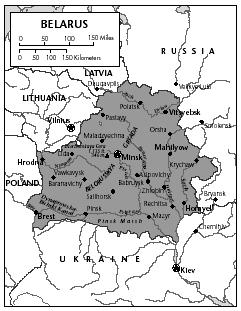Belarus - Rise to power
Lukashenko first attracted public notice when he formed a parliamentary faction called "Communists for Democracy" and when he was the only Belarusian deputy to vote against the establishment of the CIS. He wanted to retain or restore the USSR, a position he maintained more or less consistently into early 1994.
But Lukashenko's breakthrough to political prominence came when he was named chairman of the Interim Parliamentary Anti-Corruption Committee. Although that body was created by conservative Communists who wanted to drive reformist parliamentary chairman Shushkevich from office and, thus, open the way for Prime Minister Kebich to take power, Lukashenko exploited his mandate to move against corruption in all parts of the Minsk administration. For that reason, and because of his often flamboyant personal style, Lukashenko earned his nickname as the "Belarusian Zhirinovsky," a reference to the colorful Russian political figure, Vladimir Zhirinovsky. (In this context, it is perhaps instructive to point out that his two "idols" are U.S. president Theodore Roosevelt and Soviet secret police chief Feliks Derzhinsky.) Drawing on popular unhappiness with the deteriorating economy, Lukashenko swamped his opponents in Belarus's first presidential elections.

In the first round on 23 June 1994, Lukashenko led a sixman field with 45.1% of the vote. Because he did not receive a majority, however, he faced a runoff with the number two candidate, Prime Minister Kebich. In that second round, Lukashenko received 80.1% of the vote, trouncing his opponent and driving him from office.
On 24 November 1996, Lukashenko won a referendum to greatly expand his powers. He signed a new constitution, effective 27 November 1996, authorizing the dissolution of Parliament and establishing a new bicameral National Assembly. In elections held 9 September 2001, he reportedly won 75% of votes cast, despite the fact that the international news media characterizes his leadership style as dictatorial and the opposition alleged that the voting process was unfair.
Comment about this article, ask questions, or add new information about this topic: